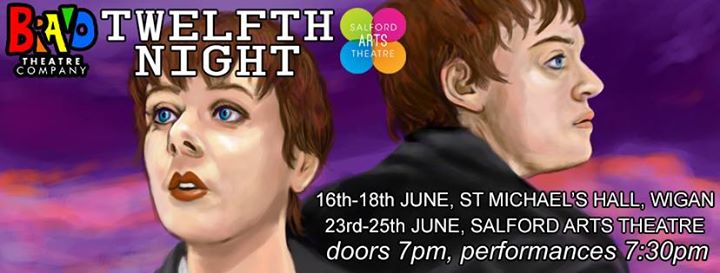Bravo Theatre Company have brought Twelfth Night to Salford Arts Theatre this week, and although it is not the first time they have performed this play, it was their opening night at this venue.
My first major criticism with this production is one which I seem to write now for almost every Shakespeare I see. Bravo chose to update their setting to that of modern day, and although it was not clear whether that actually meant the present, 1970s or 1950s, since all three eras were evidenced in their costume choices, it really didn't seem to matter since by updating it they gained nothing and lost so much. I can only agree with the changing of Shakespeare's plays to a different era if by so doing you are adding something or saying something new. Sadly, the opposite happened with this production as much of the humour was lost in Malvolio's wearing of yellow cross-gartered stockings, and the talking of swords and sword fighting didn't make any sense, among other things.
Second, several chunks of script had been cut from this production. Most of Shakespeare's plays are really quite long and wordy, and I can certainly understand, although not necessarily wholeheartedly agree with, certain cuts being made in his plays in order to both move the dialogue and plot on quicker and allow the audience to leave at a reasonable hour! However, this production seemed to omit certain important plot-developing scenes and leave too much for our imaginations (if you didn't already know the story) to join the dots.
My third and possibly most major problem I had with this interpretation, is one, which again, is not unique to this company. It is a problem which every company faces every time Twelfth Night is produced. The plot, and majority of the humour, all revolve round a case of mistaken identity. A brother and a sister dressed as a man, who should look and speak as close to identical as is humanly possible in order for the plot to be in any way believable. Producers and directors therefore have two main choices. Either cast two people who do indeed look and sound alike, or find two people who differ from each other so much that that in itself provides the comedy. Bravo had done neither. Viola and Sebastian were quite clearly meant to be the former and resemble each other identically, however, it was more than obvious that they certainly did not. Thus missing out entirely on either the actual humour as intended by Shakespeare and on the visual and perhaps slapstick humour that could have been created by using two completely opposing actors.
Twelfth Night is essentially a frivolous comedy, but has also some very beautiful speeches hidden within the froth, and can also be quite dark too, depending on choices made by the director. Malvolio is put into prison, a Duke is seemingly falling in love with a man, and a 'maid' is seen to be consorting with high society in order to bring about the 'madness' of Malvolio etc. Recipes for either comedy or something more sinister? However, none of that seemed to matter in this production, since the pace of the play never really lifted beyond second gear. It started languorously, and continued in that vein for majority of the play. The pace was further hindered by the eternally long and unnecessary scene changes. What the need was for the two red / bamboo flats-on-wheels I don't know since they added nothing to any scene and lengthened the changes. In some circumstances it seemed that the scene changes were longer than the actual scene which preceded them. Essentially, the play needs to be kept quite light and fast-moving and for all the cast to play their roles with conviction. Tonight saw a rather slow and heavy, even rather sluggish interpretation unfold with some of the worst ham over-acting I think I have ever seen.
Chris Sherburn wins first prize in the over-acting competition, as his interpretation of Sir Toby Belch overshot the mark by a considerable distance. It was neither a truthful, nor a humourful interpretation at all, which is such a pity since it is the most enjoyable for a good comedy actor to play. Not too far behind was Michael Graham's Malvolio once he starts wearing the yellow stockings.
These performances however, were making rather uncomfortable bedfellows with some very sincere and real acting. For my money, the best performance (despite being given the most ridiculous costume and make-up) was undoubtedly Emily Grogan as Feste. Trying desperately to keep the mood light and swift, her sense of comedy and timing was well placed, along with a very easy to listen to voice. Other notable performances came from Ellen Bond playing Viola. (Whom I have to admit to not being too keen on at first but her performance grew on me), and Ruth Murray's rather stalwart and upright Olivia. Scott Riley had a lovely stage presence, but had a lot of surplus energy. If he had used and channelled that energy into his body rather than speeding his vocal delivery as he did, he would have made a much more real and personable Sebastian; and Luke Richards, as Antonio, provided the cast with some much needed bass tones, as his low and sonorous voice was used to good effect, giving him gravitas when found and captured.
The play as a whole had only a few enjoyable moments, [my favourite, and for all the wrong reasons, being an exceedingly silly and cringe-worthy hiding in the bushes to overhear Malvolio!] and was directed by Sammy Holden with scant understanding of the text and subtext of the play. Pity.
Reviewer: Mark Dee
Reviewed: 23rd June 2016
North West End Rating: ★

